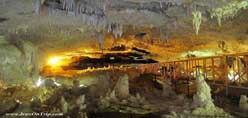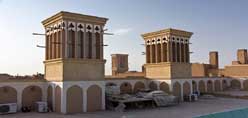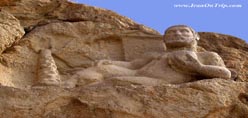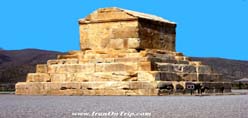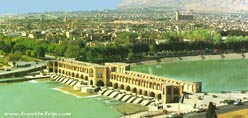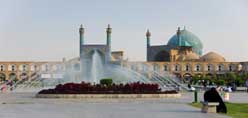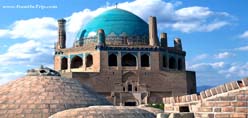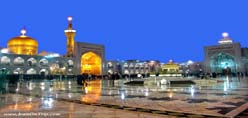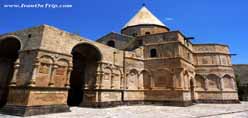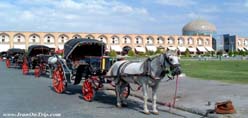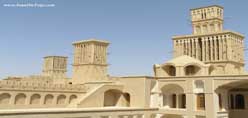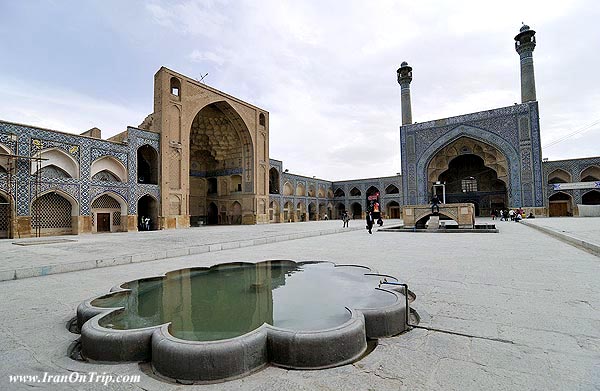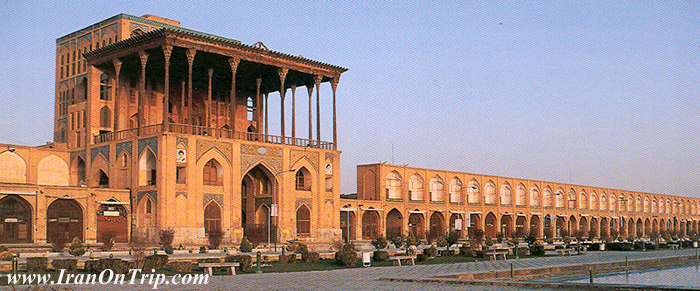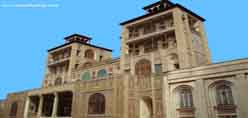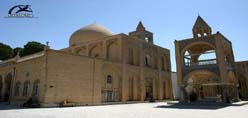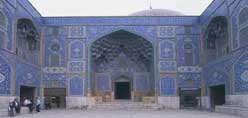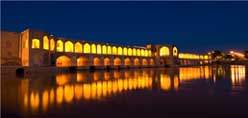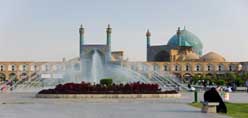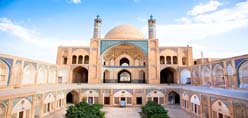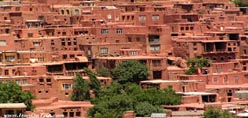Umayyad Caliphate in Persi

It would be impossible in a history of Persia, to ignore the importance of the Omayyad dynasty, which ruled the vast Moslem empire for nearly a century. Muavia began his reign in Syria in A.h. 35 (656), and he became Caliph of the entire Moslem world upon the abdication of Hasan in A.h. 40 (661), but it was not until two years later that he entered into possession of all the lands of the Caliphate.
It was at this date that Ziad, Ali's Governor of Pars, became reconciled to him, and presented himself under a safe-conduct at Damascus, bringing all arrears of revenue, and in addition a million pieces as a gift. His remarkable capacity secured the Caliph's public acknowledgment of his relationship with himself, and he was appointed Governor of Basra, where he ruled the turbulent Arabs with a rod of iron. Later on Kufa was added to his administration, and there he introduced a reign of terror for the purpose of crushing conspiracies that boded ill for the future of the Omayyad dynasty. The Arab chroniclers state that no viceroy ever enjoyed such powers as Ziad, who ruled from the Euphrates to the Indus and Jaxartes, and maintained a court modelled on that of the Great King.

Coin of the Umayyad Caliphate, based on a Sassanian prototype. Copper falus, Aleppo, Syria, circa 695.
During the Caliphate of Muavia the yoke of the Arabs was fixed more securely on the East. Herat, which had rebelled in A.h. 41 (662), was stormed, and so was Kabul two years later. Ghazni, Balkh, and Kandahar were visited by Moslem armies. In A.h. 54 (674) the Oxus was crossed and Bokhara captured, and in A.h. 56 (676) Samarcand fell to the Moslems, who strengthened their position up to the Jaxartes on the north and to the Indus on the south. In short, they became successors of Alexander the Great.
From Basra and Kufa Ziad governed Persia through his sons. The province of Khorasan, which at this period comprised the Moslem empire east of the Lut as far as the confines of India, was divided into four great districts, with their centres at Nishapur, Merv, Herat, and Balkh respectively. Of these cities only the firstnamed lies within the limits of modern Iran. It was at this time, too, that Arab colonies were planted in Khorasan, traces of which still survive, although the Mongol invasions shattered their power. I have, indeed, myself frequently come across small bodies of Arab tribesmen, and a regiment termed the Arab va Ajam is still recruited in the Shahrud district.
In AH 65 the Kharijites, whose sinister activity kept Persia perpetually convulsed, visited the tomb of Husayn at Kerbela and bewailed their desertion of his cause. They then invaded Syria, but were defeated and returned to Kufa. In the following year there were tribal fights in Kufa which ended in a massacre of all who had opposed Husayn. Persians exult over the just retribution which fell upon Shimr, Amr, and other citizens, many of whom were put to death with torture ; and owing to the vigilance of Mukhtar but few escaped. The heads of Amr and his son were sent to the Hanifite, who appears to have been merely a tool of a crafty intriguer.
In a period of universal tyranny and oppression, when tyrants like Hajjaj represented the Caliph, it is certain that the Persian people were worse treated than under the first four Caliphs, who invariably attempted to secure justice and to repress tyranny and corruption. The inhabitants of Khorasan were largely instrumental in the overthrow of the Omayyad dynasty. It was among them that the Abbasid agents found their most devoted followers, with the remarkable spectacle of a people risking life and property to serve a man of an alien race whom they had never seen, and serving him with rare fidelity and devotion. It was this spirit inspiring the followers of the Black Standard which enabled them to overcome the Arabs of Syria, who were lukewarm so far as the Caliph was concerned, and thought merely of their personal, or at most their tribal interests. Consequently, in a sense the victory won by the men of Khorasan may be regarded as a sign of national awakening on the part of the oppressed Persians, who must have been conscious that in all that made for civilization they were superior to their Arab masters.
.....
.....
.....

.jpg)



